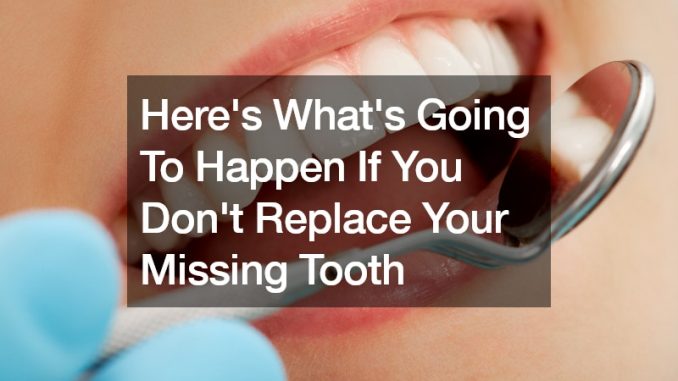

Losing a tooth can be more than just a cosmetic concern; it can have serious implications for your oral health and overall well being. Whether it’s due to injury, decay, or extraction, ignoring a missing tooth can lead to a cascade of issues that extend far beyond the initial gap in your smile. In this comprehensive guide, we’ll explore the consequences of not replacing a missing tooth and discuss why seeking proper treatment is essential for maintaining oral health.
Introduction
The loss of a tooth can be a distressing experience, impacting not only your ability to chew and speak but also your confidence and self esteem. However, the repercussions of leaving a gap in your smile go beyond aesthetics.
From bone loss to dental shifting, untreated tooth loss can set off a chain reaction of oral health problems that may worsen over time.
The Domino Effect of Untreated Tooth Loss
One of the most immediate consequences of failing to replace a missing tooth is bone loss in the jaw. When a tooth is lost, the underlying bone no longer receives stimulation from chewing, causing it to gradually deteriorate. This process, known as resorption, can result in changes to the shape and structure of the jawbone, leading to further tooth loss and facial collapse over time.
Additionally, the absence of a tooth can disrupt the alignment of neighboring teeth, causing them to shift or tilt into the empty space. This movement can create bite problems, such as malocclusion, which may result in difficulty chewing, jaw pain, and increased risk of dental issues like decay and gum disease.
The Psychological Impact of Untreated Tooth Loss
Untreated tooth loss can have significant psychological consequences, affecting self esteem, confidence, and social interactions. Individuals with missing teeth may experience embarrassment or self consciousness, leading to avoidance of social situations or smiling. This can impact relationships, job opportunities, and overall quality of life. Moreover, untreated tooth loss may contribute to anxiety and depression in some individuals, as they struggle with the negative perception of their appearance. Seeking timely treatment and replacing missing teeth can help alleviate these psychological burdens, restoring confidence and improving mental well being.
Financial Considerations of Delaying Tooth Replacement
Delaying tooth replacement can lead to long term financial implications. While it may seem cost effective initially to postpone treatment, untreated tooth loss can result in additional dental issues that require more extensive and expensive procedures in the future. For example, adjacent teeth may shift, leading to misalignment and the need for orthodontic treatment. Moreover, bone loss in the jaw can occur, necessitating bone grafting procedures to support dental implants later on. By delaying tooth replacement, individuals may incur higher dental expenses and face greater financial strain in the long run. Investing in timely tooth replacement can ultimately save money by preventing further dental complications and maintaining oral health.
Understanding Your Tooth Replacement Options
While the consequences of untreated tooth loss can be concerning, the good news is that there are effective solutions available to restore your smile and preserve your oral health. One of the most common options for replacing a missing tooth is a dental implant, a titanium screw that is surgically placed into the jawbone and topped with a replacement tooth.
Dental implants offer several advantages over traditional tooth replacement methods, such as bridges and dentures. Unlike bridges, which require the alteration of adjacent teeth, implants preserve the integrity of neighboring teeth and provide long term stability and functionality. Additionally, implants stimulate the jawbone, helping to prevent bone loss and maintain facial structure.
The Importance of Seeking Timely Treatment
While the decision to replace a missing tooth is ultimately a personal one, it’s essential to consider the potential consequences of delaying or forgoing treatment. Ignoring a missing tooth can lead to a host of oral health issues, including bone loss, dental shifting, and bite problems, which may necessitate more extensive and costly interventions down the line.
Moreover, untreated tooth loss can impact your overall health and well being, affecting everything from your ability to eat nutritious foods to your confidence in social and professional settings. By addressing tooth loss promptly and seeking appropriate treatment, you can avoid these complications and enjoy a healthy, functional smile for years to come.
Conclusion
In conclusion, failing to replace a missing tooth can have far reaching consequences for your oral health and quality of life. From bone loss to dental shifting, untreated tooth loss can set off a chain reaction of problems that may worsen over time. However, by understanding the importance of tooth replacement and exploring your options with a dental professional, you can take proactive steps to preserve your smile and maintain optimal oral health. Don’t let a missing tooth hold you back—seek timely treatment and invest in your long term well being.
.
